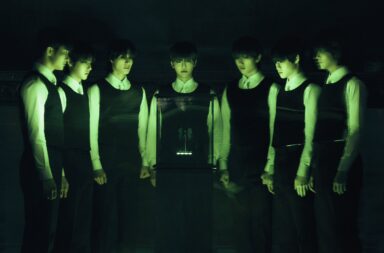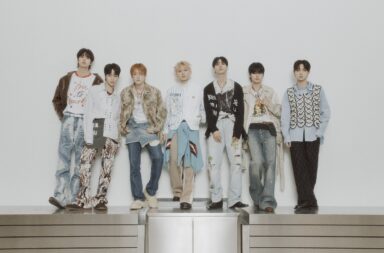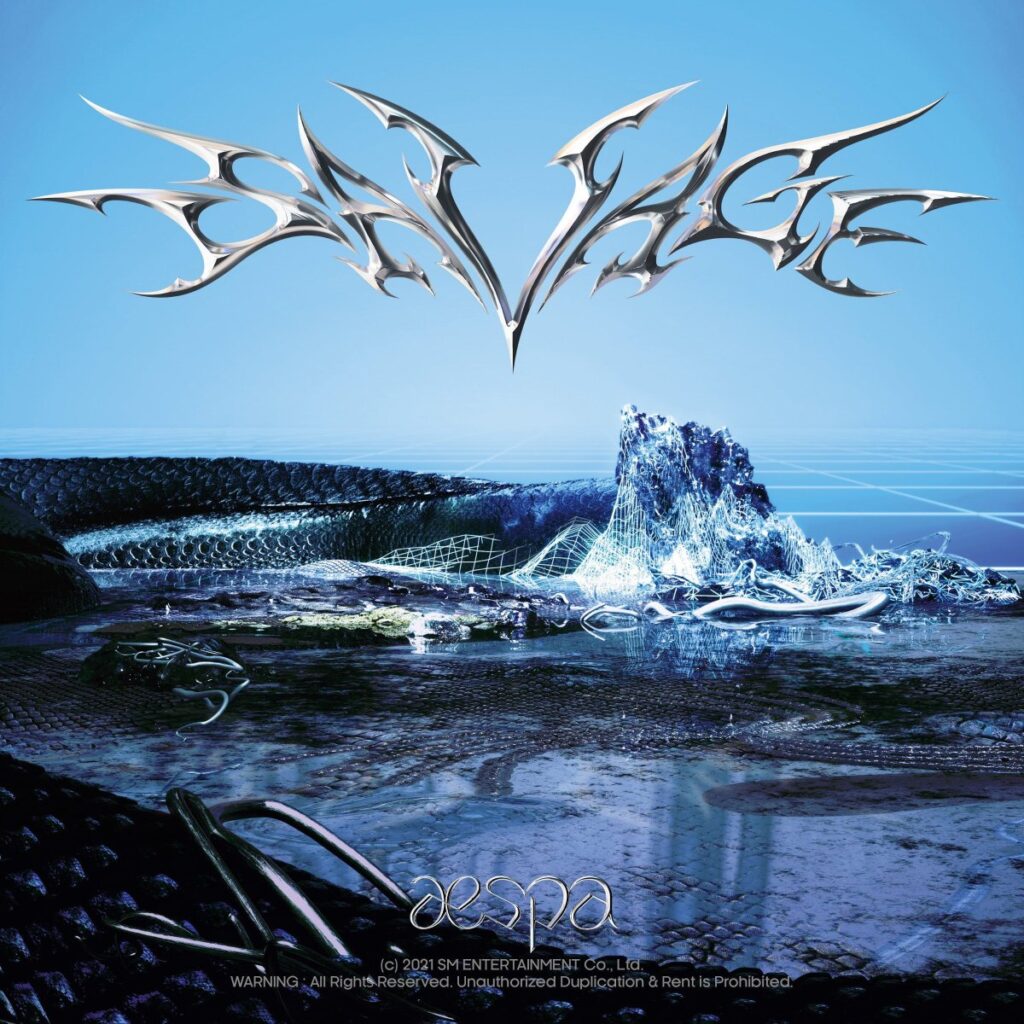
Considering the sheer, daredevil eccentricity of Aespa’s recent single, “Next Level”, you’d be forgiven for being dubious about its appeal to the general public; even savvier K-pop fans used to the genre’s many quirks found it polarising. But against all odds, “Next Level” became a viral hit for the four-member girl group from SM Entertainment, helped by its catchy, bitesize hook and iconic choreography which were perfect for social media. The song topped charts in Korea and stayed charting for weeks, launching the quartet – who have not yet even reached their first anniversary – into the top ranks of this generation’s girl groups almost overnight.
Aespa have swiftly followed up that success with the group’s first EP, Savage, which contains six tracks including a title track of the same name. Already, “Savage” is sweeping domestic charts, proving that they are more than a one-hit wonder, and the EP itself recorded an impressive 400,000 pre-orders. Being their first album, Savage clearly aims to make a strong impact and to that end is both punchy and cohesive, summarising Aespa’s style and concept neatly in six filler-free songs. Each punch lands cleanly and they transition smoothly, from the boisterous anthem “Aenergy” all the way through to the smooth and wintry “Lucid Dream”. It is lean, mean, and plays nicely into their concept of being machines; it is also a statement that they have a lot more yet to offer, not only by way of catchy hits, but cultural commentary and impact.
They capture and capitalise on the growing appetite for stronger female role models, currently manifesting within K-pop as a trend towards girl crush concepts and, more widely, the popularity of figures like Jessi and shows like Street Woman Fighter. As its name suggests, Savage is not warm, forgiving, or soft-hearted in the slightest. Instead, it is cold, harsh, and abrasive, and quite refreshing for it.
The songwriting and production have a hard, metallic quality, while the lyrics are blunt and unapologetic – they’ll “crush you”, “break you into pieces”, then “make you cry” for good measure. Of course, like “Black Mamba” and “Next Level”, their lyrics are still full of lore-specific terminology and as such remain at times bewilderingly cryptic, overly fanciful, and lacking wit to the point of being cringe-worthy. The game-inspired character classes referenced in “Aenergy” are a case in point:
Ask about the decoy
You became KOSMOzen
Nævis, she sent us here
Karina is a rocket puncher
Winter an armamenter
Gisеlle got Xenoglossy
Ningning e.d hacker
Lyrics aside, however, “Aenergy” is an addictive and (musically) no-nonsense introduction to the album, declaring their ambition to make an impact and backing it up with a credible force and vitality. The anthemic quality of the chorus, empowered by piercing vocals sung in unison, makes “Aenergy” one of the most memorable and revisitable points on the album, even with its questionable lyrics.

More generally, the idea of inventing new technical jargon specific to the group is at least interesting, and with more time and subtlety could work to their advantage. More than ever, we are exposed to and adopting previously meaningless phrases in order to keep up with technology, such as “Bluetooth”, “Bitcoin”, and even “the Internet”. Likewise, if we can pick up words like “stan”, “stream”, and “maknae” in order to obtain a sense of belonging within the K-pop community, then doing the same on a smaller scale should be easy, and could become a powerful source of unity and in-groupness for Aespa’s fans.
After all, the success of “Next Level” means that these words are already floating around in the public consciousness; soon, there could be enough people that understand it for everyone else to become outsiders (“Muggles”, if you will). There is also potential for Aespa’s world-building to eventually create a space for thought-provoking social commentary on the current technological age, whilst also evolving in real time alongside it – not something you can say about most groups.
“Aenergy”’s fearless attitude and aggressive production are redoubled by “Savage”, which follows as one of K-pop’s most interesting and experimental songs since, well, “Next Level”. The song juxtaposes grimy, industrial beats inspired by hyperpop (see Charli XCX and Sophie) with a beautifully melodic prechorus and bridge, uplifted by powerful vocals from Winter, Ningning, and to a lesser extent Karina. The instrumental boasts possibly the grungiest beat that any girl group have rapped over in recent years, out-grunging not just all of their girl-crush rivals, but also fellow technology-inspired SM group NCT’s entire offering this year. Lyrically, it is a continuation of their fantastical narrative, filled with venom and vitriol for an unspecified enemy:
I’m a killa’, who will break you, ae
You’re still hiding and hallucinating
Beat you up, we holler
I’m not afraid of you, you, hit you harder
Push me in, deep fake on me
To the unprepared stage
Corner me in, fake on me
Got everybody, mock up to me
While the song is, like “Next Level”, a smorgasbord of genres and sections, it is at least more cohesive than its predecessor, while benefiting from similarly catchy earworm hooks. Importantly, SM understand that the public reception to a work of art depends on all of the context that has come before it – they took a gamble with “Next Level”, winning large-scale acceptance, and now a song as strange as “Savage” has become not only much more approachable, but extremely welcome. Having whetted the audience’s appetite by showing them what was possible with “Next Level”, they are hungry for more – “Savage” is exactly what the people want, at the exact time they want it.
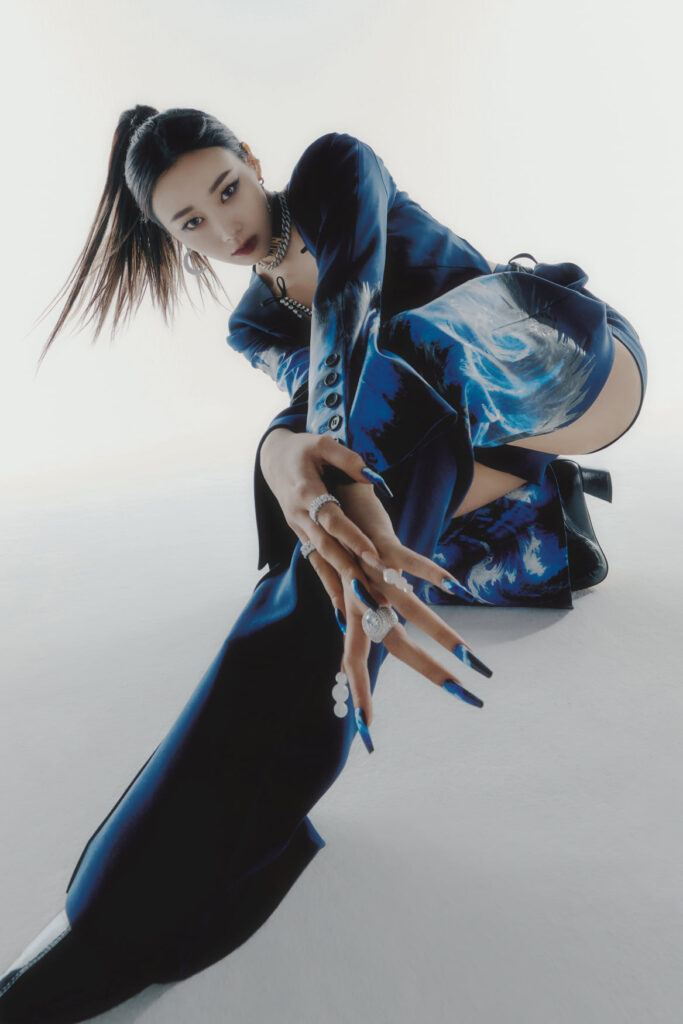
As with previous songs, Giselle’s and Karina’s rap execution leave something to be desired, but this is more than compensated for by Aespa’s excellent vocals which imbue their sound with sophistication and mature femininity. Across Aespa’s discography so far, these vocals have been what give them their strongest credibility as performers; Ningning’s ad libs at the end of “Savage” and “I’ll Make You Cry” are stunning, while Winter’s high notes give songs the climax they need to resolve satisfyingly. However, the members’ similar vocal colours mean that their voices do blend at times, and they also tend towards piercing – the softer, slightly more breathy technique they use on “Lucid Dream” is much more pleasant to listen to.
Not coincidentally then, “Lucid Dream” is yet another highlight on the album, with refreshingly simple composition and a cool, hazy atmosphere. Like the rest of the album, it has a silvery, metallic quality which separates them from their seniors Red Velvet, but it is also sleek and feminine in a way that separates them from NCT. The track sees Aespa foray into R&B, with a distinctive take on the genre that firmly differentiates them from what Red Velvet are already offering in this category. In contrast to Red Velvet’s warm, candle-lit style of retro R&B, “Lucid Dream” makes use of ice-cave-style reverb, frosty synths, and robotic vocal chops to create a brand of R&B that is cool, electric, and thoroughly modern.
As a result, the song’s dreamy atmosphere feels like a shift away from pure human surreality into sheer virtual reality; the distorted vocal chops which mirror Aespa’s breathy voices on the chorus are a particularly clever allusion to their virtual avatars. Similarly, the narrative moments of spoken English at the end of “Lucid Dream”, as well as in the intro to “Savage” and scattered throughout “I’ll Make You Cry”, play nicely (though perhaps unintentionally) into their concept. They are just stilted and unnatural enough to sound like AI speech synthesis, or the cutscene lines of a videogame character, instead of a human monologue.
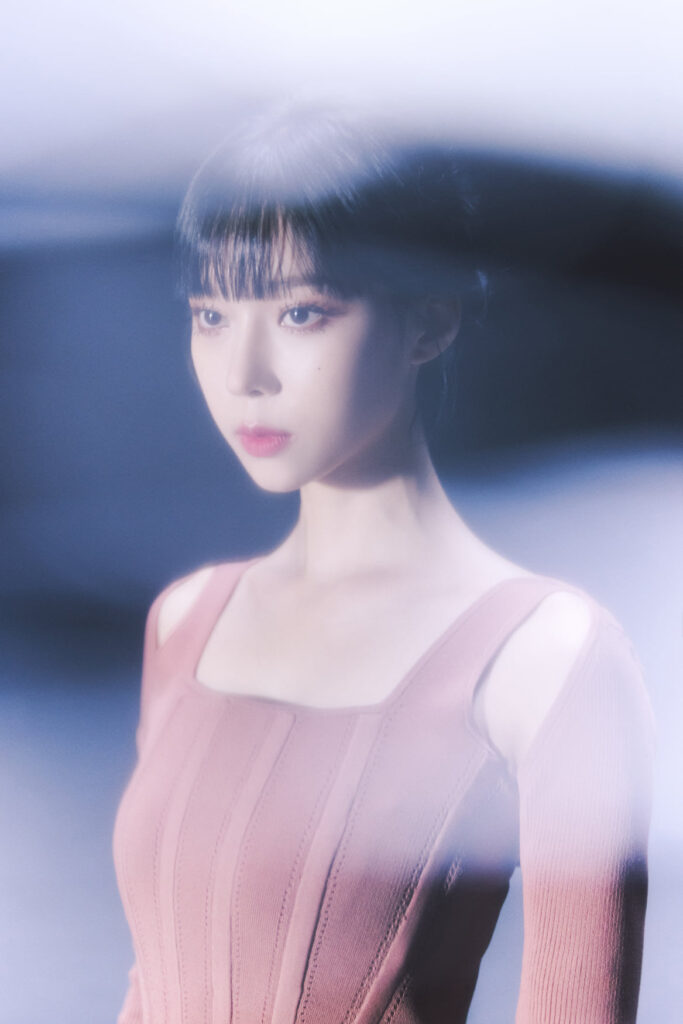
This epitomises the crucial side effect of claiming to have virtual counterparts; despite SM presenting Aespa’s dichotomy as existing between their human selves and their “æs”, the concept bleeds into and colours the genuine dichotomy between the girls’ stage personas and their real-life personalities. What that means is that every little detail about Aespa’s performances feels like a manifestation of their concept – the fact that certain recorded lines sound strangely unnatural, and that they perform with next to no facial expressions, and even that they all seem to have strikingly similar vocal tones and doll-like facial features.
Even just as a subconscious thought lurking in the back of your mind, the effect of this is that Aespa come across as strangely captivating, and when applied to the lyrics of “Lucid Dream” – which might otherwise be interpreted as a simple love song – the result is what feels like a spine-chilling story of an AI falling in love with a human from the depths of the digital world:
This dream that I can’t wake up from
Like a lost night in the dark
Wandering like I was possessed constantly by you
No, no, no, I can’t stop love
The place that led me by whispering deeper
I’ll follow you here forever
Even in the dark ‘til the end, it’s still you
No, no, no, I can’t stop love
“Aenergy”, “Savage”, and “Lucid Dream” thus form the strongest trio of songs from this EP. The remainder of the album is enjoyable, but shifts away from their core concept with lyrics and production that are less original, thus less interesting. Still, the overall listening and storytelling experience that Savage offers is one which is satisfyingly deep and immersive, with plenty of interesting expansion on Aespa’s sound. The fact that that expansion flows in parallel with the wider concept and lore that they have chosen to be governed by is a significant bonus; overall, Savage is an undoubtedly successful debut EP, both musically and conceptually.

It is worth noting that while “Next Level”’s popularity was somewhat unexpected, the group’s overall current momentum is not, and for SM it is likely that everything is going according to plan. The company’s voracious appetite for innovation and experience in creating hits meant that large-scale success for Aespa was simply a question of time and the only surprises here are that it took less than a year (considering SM’s last experimental group NCT took four years to achieve anything similar), and that it was with a song as unconventional as “Next Level”.
It is also especially appropriate that Aespa should be speeding towards the levels of popularity and influence that their Big Three rivals are enjoying, because Aespa’s style, music, and member composition are SM’s clear answer to YG Entertainment’s Black Pink and JYP Entertainment’s Itzy, as well as virtual League of Legends girl group K/DA. Their current sound and core concept respond to select elements from each, while also incorporating SM’s signature taste for sophisticated elegance, maximalist experimentation, and deep meaning.
For example, the prechorus of “Savage” seems almost directly inspired by those of Black Pink title tracks such as “How You Like That” and “Ddu-du Ddu-du”, where a powerful and strongly groove-focused beat drops out suddenly to make way for a melodic and much more rhythmically straightforward vocal. Meanwhile, the mix of bright rap and vocal quips over an equally chatty instrumental on “Yeppi Yeppi” distinctly recalls the sassy, chaotic sound that Itzy have currently claimed for their own. However, Aespa refine Itzy’s formula with higher-quality execution; “Yeppi Yeppi”’s chorus is just as catchy as “Wannabe” and “Dalla Dalla”, while benefiting from a much stronger vocal delivery.
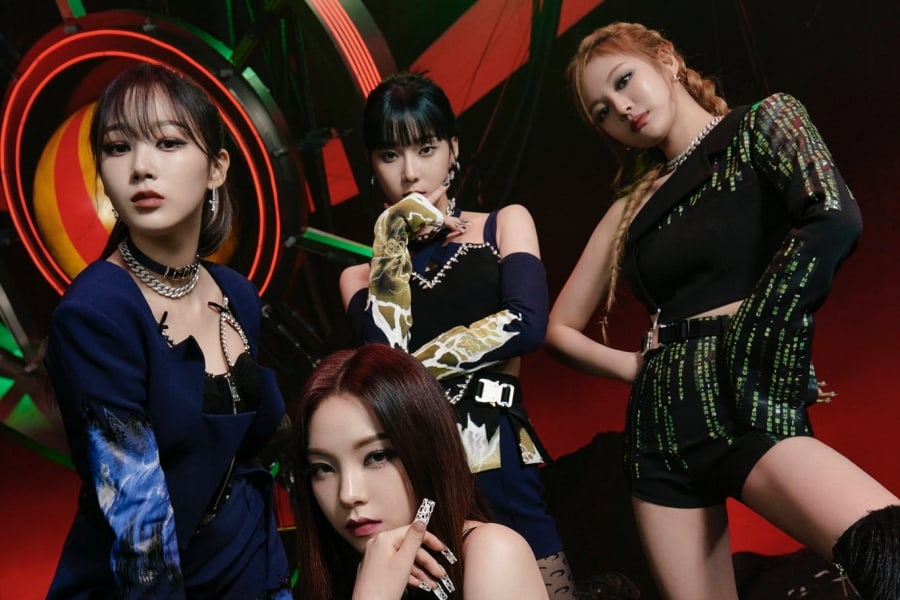
Finally, Aespa’s offering on Savage seems to most closely reflect the impact of K/DA, even beyond the obvious parallel of having virtual avatars. This is unsurprising as despite being masterminded by an American video game company (Riot Games casted guest artists including (G)-Idle’s Soyeon and Miyeon to perform as four female League of Legends characters), K/DA benefits from some of the strongest and most polished songwriting and production currently associated with K-pop.
The powerful drums, reverberating bass, epic triumphant choruses, soaring vocals, biting rap, scathing lyrics, and futuristic sound effects, not to mention impeccable mixing and mastering – all of these made K/DA’s songs impactful and refreshing, and all have been referenced here to help reinforce Aespa’s concept and musical credibility. However, K/DA remain limited by their thematic focus on winning battles, as well as their commercial purpose as a temporary project group to sell the videogame. In contrast, SM are intelligently applying their creativity and forward-thinkingness to add substance and longevity to Aespa’s concept, supplementing their music with ahead-of-the-curve trends and creating ample room for cultural commentary in the years ahead.
SM have thus done an impressive job of combining the best of all three to form a new, alternative girl group that is not to be underestimated. Notably, they are striking a good balance between too much and too little – despite being full of sonic twists and turns, Aespa’s EP is one of the most focused and consistent of SM’s recent releases. Whereas many groups end up creating chaos through utilising music in a loose, confused way, SM utilise chaos in a careful, controlled way to create music, adhering to a sturdy, overarching concept and showing impressive mastery over the details. The benefit of such discipline is that it helps each release stay focused and consistent; they keep the group’s long-term career goal in mind and prioritise staying on track to achieve that, rather than abandoning it to chase short-term gains.
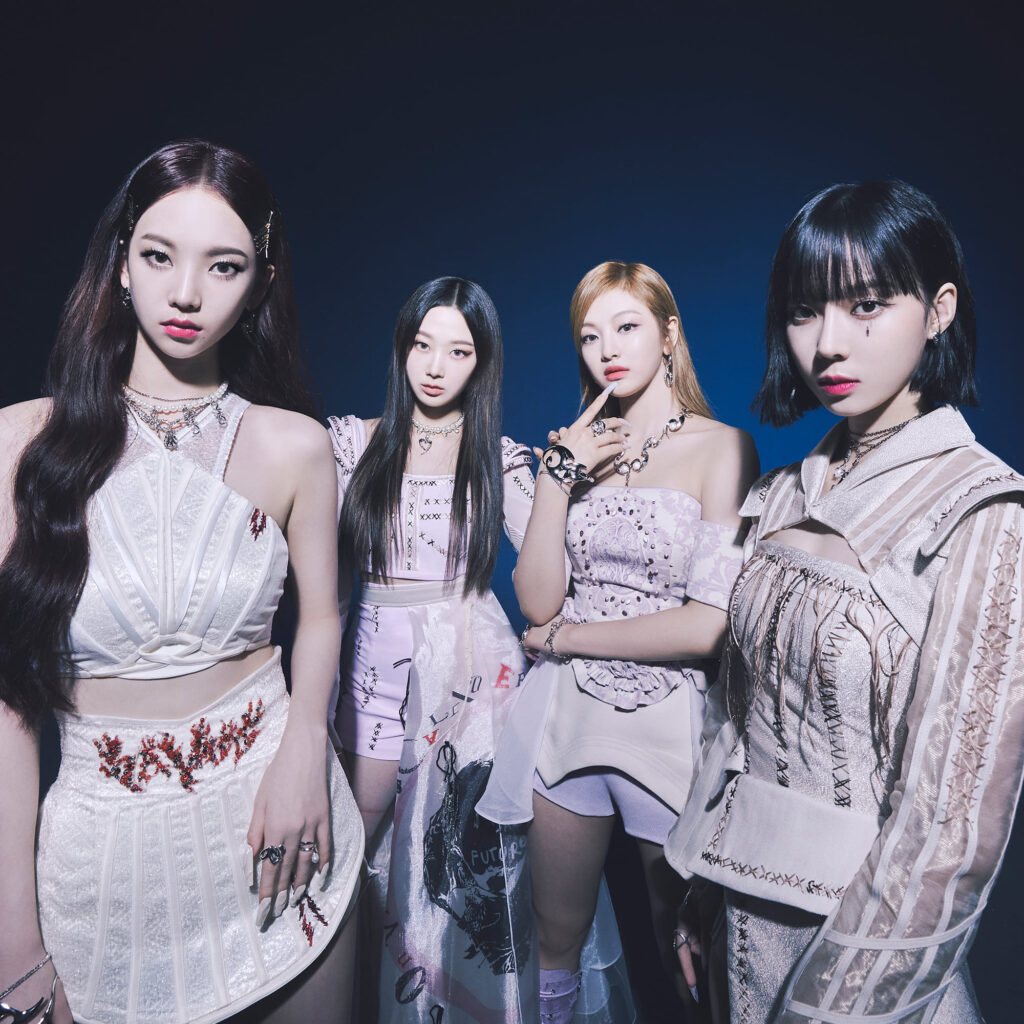
As such, Aespa could very quickly leap to the forefront of K-pop’s current cohort, becoming a viable alternative for fans that are looking for more unique, sophisticated, and modern female role models, as well as a thrilling, science-fiction-inspired, technology-infused, future-oriented fan experience. The more mature and less tacky approach that SM have adopted with Savage has opened up many more interesting concept options for future releases, all of which could help them build their credibility as unique artists with something to say and embed their concept deeper until it is no longer a gimmick. It may still be early days, but it is not hard to believe that with Aespa, SM really are onto something.
(YouTube, Naver [1][2], Yonhap News Agency. Lyrics via Genius [1][2][3]. Images via SM Entertainment.)

